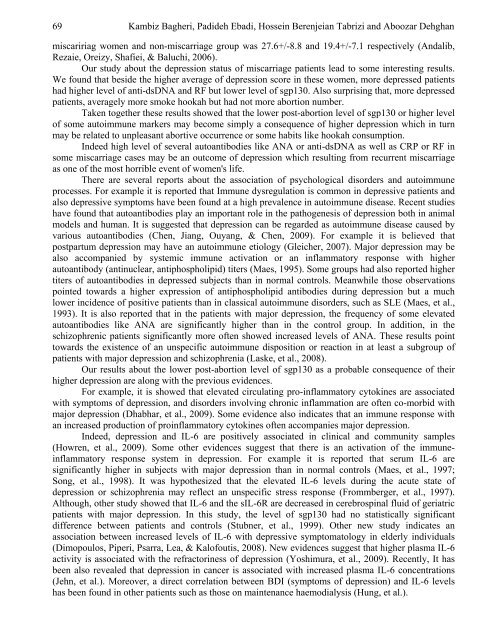Decreased Circulating Level of Soluble Glycoprotein ... - EuroJournals
Decreased Circulating Level of Soluble Glycoprotein ... - EuroJournals
Decreased Circulating Level of Soluble Glycoprotein ... - EuroJournals
Create successful ePaper yourself
Turn your PDF publications into a flip-book with our unique Google optimized e-Paper software.
69 Kambiz Bagheri, Padideh Ebadi, Hossein Berenjeian Tabrizi and Aboozar Dehghan<br />
miscaririag women and non-miscarriage group was 27.6+/-8.8 and 19.4+/-7.1 respectively (Andalib,<br />
Rezaie, Oreizy, Shafiei, & Baluchi, 2006).<br />
Our study about the depression status <strong>of</strong> miscarriage patients lead to some interesting results.<br />
We found that beside the higher average <strong>of</strong> depression score in these women, more depressed patients<br />
had higher level <strong>of</strong> anti-dsDNA and RF but lower level <strong>of</strong> sgp130. Also surprising that, more depressed<br />
patients, averagely more smoke hookah but had not more abortion number.<br />
Taken together these results showed that the lower post-abortion level <strong>of</strong> sgp130 or higher level<br />
<strong>of</strong> some autoimmune markers may become simply a consequence <strong>of</strong> higher depression which in turn<br />
may be related to unpleasant abortive occurrence or some habits like hookah consumption.<br />
Indeed high level <strong>of</strong> several autoantibodies like ANA or anti-dsDNA as well as CRP or RF in<br />
some miscarriage cases may be an outcome <strong>of</strong> depression which resulting from recurrent miscarriage<br />
as one <strong>of</strong> the most horrible event <strong>of</strong> women's life.<br />
There are several reports about the association <strong>of</strong> psychological disorders and autoimmune<br />
processes. For example it is reported that Immune dysregulation is common in depressive patients and<br />
also depressive symptoms have been found at a high prevalence in autoimmune disease. Recent studies<br />
have found that autoantibodies play an important role in the pathogenesis <strong>of</strong> depression both in animal<br />
models and human. It is suggested that depression can be regarded as autoimmune disease caused by<br />
various autoantibodies (Chen, Jiang, Ouyang, & Chen, 2009). For example it is believed that<br />
postpartum depression may have an autoimmune etiology (Gleicher, 2007). Major depression may be<br />
also accompanied by systemic immune activation or an inflammatory response with higher<br />
autoantibody (antinuclear, antiphospholipid) titers (Maes, 1995). Some groups had also reported higher<br />
titers <strong>of</strong> autoantibodies in depressed subjects than in normal controls. Meanwhile those observations<br />
pointed towards a higher expression <strong>of</strong> antiphospholipid antibodies during depression but a much<br />
lower incidence <strong>of</strong> positive patients than in classical autoimmune disorders, such as SLE (Maes, et al.,<br />
1993). It is also reported that in the patients with major depression, the frequency <strong>of</strong> some elevated<br />
autoantibodies like ANA are significantly higher than in the control group. In addition, in the<br />
schizophrenic patients significantly more <strong>of</strong>ten showed increased levels <strong>of</strong> ANA. These results point<br />
towards the existence <strong>of</strong> an unspecific autoimmune disposition or reaction in at least a subgroup <strong>of</strong><br />
patients with major depression and schizophrenia (Laske, et al., 2008).<br />
Our results about the lower post-abortion level <strong>of</strong> sgp130 as a probable consequence <strong>of</strong> their<br />
higher depression are along with the previous evidences.<br />
For example, it is showed that elevated circulating pro-inflammatory cytokines are associated<br />
with symptoms <strong>of</strong> depression, and disorders involving chronic inflammation are <strong>of</strong>ten co-morbid with<br />
major depression (Dhabhar, et al., 2009). Some evidence also indicates that an immune response with<br />
an increased production <strong>of</strong> proinflammatory cytokines <strong>of</strong>ten accompanies major depression.<br />
Indeed, depression and IL-6 are positively associated in clinical and community samples<br />
(Howren, et al., 2009). Some other evidences suggest that there is an activation <strong>of</strong> the immuneinflammatory<br />
response system in depression. For example it is reported that serum IL-6 are<br />
significantly higher in subjects with major depression than in normal controls (Maes, et al., 1997;<br />
Song, et al., 1998). It was hypothesized that the elevated IL-6 levels during the acute state <strong>of</strong><br />
depression or schizophrenia may reflect an unspecific stress response (Frommberger, et al., 1997).<br />
Although, other study showed that IL-6 and the sIL-6R are decreased in cerebrospinal fluid <strong>of</strong> geriatric<br />
patients with major depression. In this study, the level <strong>of</strong> sgp130 had no statistically significant<br />
difference between patients and controls (Stubner, et al., 1999). Other new study indicates an<br />
association between increased levels <strong>of</strong> IL-6 with depressive symptomatology in elderly individuals<br />
(Dimopoulos, Piperi, Psarra, Lea, & Kal<strong>of</strong>outis, 2008). New evidences suggest that higher plasma IL-6<br />
activity is associated with the refractoriness <strong>of</strong> depression (Yoshimura, et al., 2009). Recently, It has<br />
been also revealed that depression in cancer is associated with increased plasma IL-6 concentrations<br />
(Jehn, et al.). Moreover, a direct correlation between BDI (symptoms <strong>of</strong> depression) and IL-6 levels<br />
has been found in other patients such as those on maintenance haemodialysis (Hung, et al.).
















